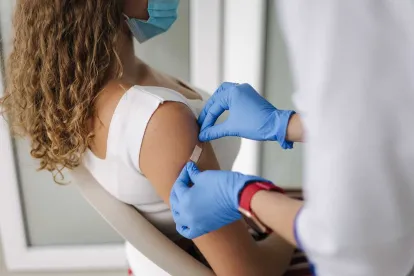On December 15, 2021, New York City released guidance on the private employer vaccine mandate set to take effect on Monday, December 27. As we previously reported, the mandate will require workers in New York City who perform in-person work or interact with the public to show proof they have received at least one dose of a COVID-19 vaccine by December 27. Partially vaccinated workers then have 45 days to show proof of their second dose.
The December 15 guidance includes: (1) a Health Commissioner’s Order Requiring COVID-19 Vaccination in the Workplace; (2) a set of FAQs; and (3) guidance on equitable implementation and accommodations for workers. Key takeaways from this guidance are as follows:
Covered Businesses and Workers
The vaccine mandate applies to all employers that employ one or more workers in New York City or that maintain a workplace in New York City. The mandate also applies to self-employed individuals and sole proprietors who work at a workplace or interact with workers or the public in the course of their business.
Notably, the order does not apply to businesses who are already subject to “another Order of the Commissioner of the Department, Board of Health, the Mayor, or a State or federal entity that is in effect and requires them to maintain or provide proof of full vaccination.” The FAQs clarify that businesses subject to federal requirements that are not in effect due to a court order, such as OSHA’s currently-stayed emergency temporary standard and the federal contractor mandate, must comply with the City’s mandate.
The vaccine mandate applies to all individuals who work in-person in New York City at a “workplace,” which is defined broadly as “any location, including a vehicle, where work is performed in the presence of another worker or member of the public.” It applies not only to full-time employees, but also to part-time workers, interns, volunteers, and contractors. The mandate includes exemptions for:
-
Individuals who work from home and whose employment does not involve interacting in-person with co-workers or members of the public;
-
Individuals who enter the workplace for a quick and limited purpose;
-
Non-New York City residents who are performing artists, athletes, or individuals accompanying such performing artists or athletes who do not have to display proof of vaccination pursuant to the Key to NYC program; and
-
Individuals who have been granted a reasonable accommodation (as discussed further below).
Proof of Vaccination and Certifying Compliance
The mandate requires that covered employers verify each covered worker’s vaccination status by doing one of the following:
-
Maintaining a copy of each worker’s proof of vaccination or reasonable accommodation documentation;
-
Maintaining a paper or electronic record that includes: (1) the worker’s name; (2) whether the worker is fully vaccinated; (3) for workers who submit proof of partial vaccination, the date by which proof of the second dose must be provided; and (4) for workers who do not submit proof of vaccination because of a reasonable accommodation, that such accommodation was provided; or
-
Checking proof of vaccination daily before allowing a worker to enter the workplace and maintaining a record of the verification.
While contract workers are covered by the mandate, employers may request that the contractor’s employer confirm that the contractor is vaccinated in lieu of verifying proof of vaccination by one of the methods listed above. Businesses taking advantage of this option must maintain a record of the request as well as the confirmation from the contractor’s employer.
The guidance goes on to explain that employers may accept the following forms of proof of vaccination: (1) A CDC COVID-19 vaccine card; (2) a New York City COVID-19 Safe App record; (3) A New York State Excelsior Pass/Excelsior Pass Plus; (4) A CLEAR Health Pass; and (5) other official vaccine records from the jurisdiction where the vaccine was administered, or from a healthcare provider or other approved immunizer who administered the vaccine, that provides the person’s name, vaccine brand, and date of administration. A digital photo or photocopy of such record is also acceptable.
By December 27, businesses must also complete a certificate affirming they are in compliance with the vaccine mandate and post the certificate in a public place. Businesses should also be prepared to make their records available for inspection.
Reasonable Accommodations
The guidance also makes clear that employers must consider requests for reasonable accommodations related to the vaccine requirement from employees who request them because of disability, pregnancy, childbirth, lactation, religious beliefs or observances, or status as a victim of domestic violence, stalking, or a sex offense. Workers must request a reasonable accommodation by December 27 in order to continue working unvaccinated in a workplace covered by the order. Notably, the guidance states that employers may continue to allow workers who have requested an accommodation to enter the workplace while the request is pending.
Employers must maintain documentation stating the basis for granting accommodations for employees, including any supporting documentation provided by the requesting employee. The guidance provides employers with checklists that can be used to evaluate the exemption or accommodation request. If an employer chooses to utilize these checklists, the lists should be kept on file and maintained as a record of any exemptions or accommodations that are granted by the employer. As with any other accommodation request in New York City, employers must provide a written communication of the employer’s determination regarding the accommodation at the conclusion of the cooperative dialogue process.
The guidance provides the following, non-exhaustive list of conditions that may qualify for a permanent medical exemption: (1) the requesting employee had a severe allergic reaction after a previous dose or to a component of all three approved COVID-19 vaccines; or (2) the requesting employee has a known diagnosed allergy to a component in all three approved COVID-19 vaccines. A temporary medical exemption may be granted if the requesting employee: (1) has presented medical documentation showing that they are within 90 days of monoclonal antibody or convalescent plasma treatment of COVID-19; (2) has presented medical documentation showing they recently underwent stem cell transplant, CAR T-cell therapy, or other therapy or treatment that would temporarily interfere with the worker’s ability to respond adequately to vaccination; or (3) has pericarditis or myocarditis. Again, this list is non-exhaustive. The guidance also states that medical documentation must be from the worker’s treating physician with a valid medical license.
For religious accommodations, the guidance provides the following reasons an employee may qualify for a religious accommodation: (1) the employee has explained/documented how the belief requires the employee not to be vaccinated; (2) the employee has not taken other kinds of vaccinations previously, and if the employee has received other vaccines, they should explain why those vaccines were not against their religion; (3) the employee says their religious belief prevents them from allowing certain substances to enter their body; or (4) the employee says that they cannot take the vaccine because it was developed and/or tested using fetal cells that the worker is concerned may have been the result of an abortion, and the worker does not also take other medications similarly developed or tested using fetal cell derivative lines.
Importantly, the guidance states that in accordance with New York City Human Rights Law (“NYCHRL”), religious accommodations must be considered not only for mainstream religions, but also for employees who have religious, ethical, or moral beliefs that are sincerely held with the strength of religious views. However, the guidance also clarifies that the NYCHRL does not cover social, political, or economic views, or personal preferences, and therefore such views or preferences are not subject to accommodation or exemption.
Finally, the guidance makes clear that employers may deny accommodations that impose an undue hardship on the employer. Employers should consult EEOC guidance on what factors should be considered to determine if an undue hardship would be created by an accommodation, including financial and operational costs. Likewise, accommodations may also be denied if the unvaccinated worker would likely pose a direct threat to themselves or others.






 />i
/>i

